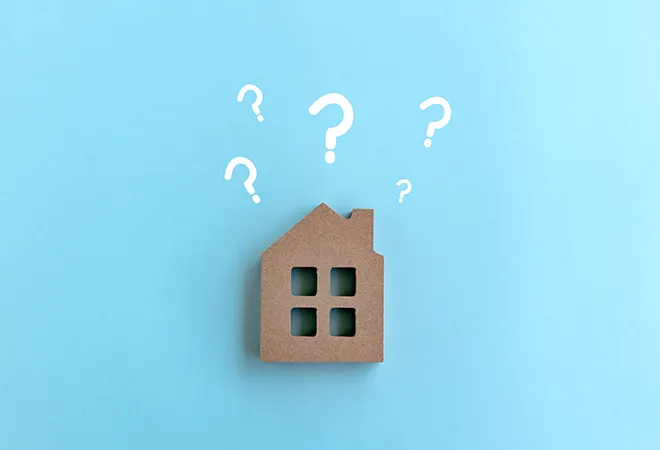
The poor recovery of property tax, the biggest revenue source for urban local bodies in India, in the first five months of year, has put city managers in a spot. The unprecedented nature of expenses incurred on health service delivery to tackle the COVID pandemic has pinned the need to put property tax reforms on the fast track. Property tax remains the only major revenue source in the municipal portfolio and it contributed about 60 percent to municipal tax revenue in India in 2017-18.
Property tax revenue accounted for 0.15 percent share of the Gross Domestic Product (GDP). This is below the estimated revenue in OECD countries which is almost over 1 percent for taxes on immovable properties as a percentage of the GDP. With almost half the financial year gone, the recovery of property taxes has become grimmer. Cities across India are in the quandary over poor tax collections till now, and the possibility of the pandemic condition deteriorating it further. On 14 September 2020, the Bangalore civic body declared that it had collected property tax of Rs 19,160 million as opposed to over Rs 20,000 million in 2019.
A similar trend was seen with the Ahmedabad Municipal Corporation which collected Rs 6,020 million till August in 2019, has managed to collect Rs 5,050 million between 1 April and 28 August this year. This has come after the corporation extended a 10 percent rebate scheme by 31 August, 2020 for early tax payers. The Mumbai civic body, on the other hand, hasn’t been able to get any revenue from property tax in its kitty because of a pending decision of waiving off taxes for all properties under 500 square feet in the city. Property tax accounts for 24 percent of the Mumbai city revenue and this decision is likely to set it back by over Rs 3,000 million. The decision is still pending and taxes have still not been collected.
With almost half the financial year gone, the recovery of property taxes has become grimmer.
Taking note of the situation, the Ministry of Housing and Urban Affairs (MOHUA) in August 2020 called for a meeting of state governments to discuss reforms and provisions. Citing the recommendations of the 15th Finance Commission, the MOHUA meeting conceded to look at few measures including increasing of property tax coverage, integrating information, frequent reevaluating property, cutting down on exemptions and concessions, sorting billing processes, simplifying payment gateways and making enforcement stringent.
While these steps are essential, the very nature of this tax needs to be assessed to understand either why it is not paid or why recovery is poor. Property taxes are levied on the potential income of a property and is not the present income, and different formulae are used in different urban local bodies. It is also a huge tranche paid once or twice annually and is seen as a burden for someone who hasn’t let his house out.
On the other hand, the recovery problems are largely to do with poor administration — contested land records, unauthorised construction, and informal markets. The Indian constitution exempts government buildings from paying property tax and the rules for different categories of buildings and ownerships vary for different cities. Only Bangalore taxes the central government buildings at 25 percent of the actual rate.
The coverage of properties can only be increased if there is a systematic method to check ownership and tenancy and illegal housing.
If we are serious about fixing property tax regimes for cities, it will mean adopting a multi-dimensional approach. The first section to be fixed will be the design itself. This will begin with re-identifying of properties in the tax registry and categories with differential tax rates. Sovereign buildings must not be exempted from taxes unless the state and central governments are compensating the municipal governments for the losses. The coverage of properties can only be increased if there is a systematic method to check ownership and tenancy and illegal housing. Modern technology of AI and blockchain could be used for setting up these systems.
The second sector to be dealt will be the assessments — valuation and revaluation of properties which is most tricky. The 15th Finance commission has recommended that the unit area value (UAV) method or the capital value method should be adopted as the standard across India. This is already in place in both Bangalore and Mumbai. Similarly, a constant revaluation system which will comprise assessments of rising property values, and self-valuation will have to be put in place. This will also bring down the administration costs significantly.
Collection of property tax directly reflects on the quality of municipal administration in that city. The poor collections in many states show that municipal governments do not have the required trained professionals to value, assess and prepare the tax rolls, challenge appeals and upgrade systems. If we are looking at efficiency in collections, there needs to be a large-scale integration of several databases. There has to be a GIS-based tracking system that keeps a check on the collection and identifies gaps.
If we are looking at efficiency in collections, there needs to be a large-scale integration of several databases.
To implement the reforms, it is imperative that all state governments set up the proposed ‘Property Tax Board’ on a war-footing and sets stringent rules to reprimand both erring ULB’s and tax payers. The board, a concept that has been pushed right from the 13th Finance commission has come into force in a diluted form in states like Tamil Nadu, Andhra Pradesh and Maharashtra. The board which is advisory in nature would look at reviewing property tax assessment systems, reworking valuation methods, and ensure that collection systems are more technologically upgraded and dynamic.
Despite all the reforms, it is important that we consider that property tax cannot be an end in itself for solving the issue of insufficient funds in cities. Property tax has remained stagnant for years and the government needs to help cities, which are highly-dependent on state and central transfers, to become independent. Several taxes like octroi, advertisement tax, local body tax which gave liquidity to ULB’s got subsumed within the GST leaving them even more dry. While the government is giving property tax reforms a push it could be enabling to levying betterment and impact fees on land could be considered.
Cities need to become financially independent and the property tax reform will be a starting point towards their economic autonomy.
The views expressed above belong to the author(s). ORF research and analyses now available on Telegram! Click here to access our curated content — blogs, longforms and interviews.




 PREV
PREV


